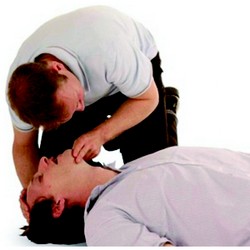 People with severe allergies need to keep epinephrine with them at all times. Exposure to the tiniest amount of an allergen can send them into anaphylaxis. If you have an allergy to nuts, you know that you have to be careful to avoid them. You have to be very careful when you eat in restaurants, because many restaurants, especially in oriental restaurants. It is your responsibility to ask how food is prepared; you need to let the server know that you are allergic to nuts. It is imperative that your food is prepared without nuts, and that your food is not prepared with any of the utensils that have been in contact with nuts. Because there is a chance of cross contamination, you must be proactive to keep yourself safe. If there seems to be a language barrier, it would be wise not to eat at the restaurant. You never know if the people preparing your food actually got the message that you must have food prepared without nuts. You should never taste foods if you do not know what is in them. If you have a serious nut allergy, just a taste could send you into anaphylactic shock, and you could die.
People with severe allergies need to keep epinephrine with them at all times. Exposure to the tiniest amount of an allergen can send them into anaphylaxis. If you have an allergy to nuts, you know that you have to be careful to avoid them. You have to be very careful when you eat in restaurants, because many restaurants, especially in oriental restaurants. It is your responsibility to ask how food is prepared; you need to let the server know that you are allergic to nuts. It is imperative that your food is prepared without nuts, and that your food is not prepared with any of the utensils that have been in contact with nuts. Because there is a chance of cross contamination, you must be proactive to keep yourself safe. If there seems to be a language barrier, it would be wise not to eat at the restaurant. You never know if the people preparing your food actually got the message that you must have food prepared without nuts. You should never taste foods if you do not know what is in them. If you have a serious nut allergy, just a taste could send you into anaphylactic shock, and you could die.
 Exposure to nuts when you are allergic could manifest with the mouth and lips feeling tingly. You may break out in hives within the mouth or elsewhere on the body. You could have stomach cramps, nausea, vomiting and diarrhea. You could suddenly be unable to swallow, or find it difficult to breathe. You could feel dizzy, and faint. In anaphylactic shock, your airways could constrict enough to obstruct your breathing. Your blood pressure could drop, and you could die.
Exposure to nuts when you are allergic could manifest with the mouth and lips feeling tingly. You may break out in hives within the mouth or elsewhere on the body. You could have stomach cramps, nausea, vomiting and diarrhea. You could suddenly be unable to swallow, or find it difficult to breathe. You could feel dizzy, and faint. In anaphylactic shock, your airways could constrict enough to obstruct your breathing. Your blood pressure could drop, and you could die.
Young children, teens and young adults can be deathly allergic to tree nuts, peanuts, and other food substances. Nut allergies seem to get worse as the child gets older. While it is true that some children will outgrow a nut allergy, it isn’t likely to happen to the majority of kids who are allergic. At school, there must be a plan of action in place for children with anaphylactic allergies. Whether the child has a nut allergy, wheat allergy, or bee sting allergy, the family must inform the school. Parents must provide written documentation from the child’s doctor to identify the type of allergy and what must be done for the child. Each child with an anaphylactic allergy must have a minimum of 2 Epi-pens. The school nurse’s office should have one, if allowed, the student would need to have an Epi-pen in his/her backpack, where someone could administer it if the child couldn’t. Oftentimes, a child may not have time to self-administer the Epi-pen when going into anaphylaxis. Sometimes a parent has to accompany a child for school functions, if the doctor won’t sign off on a child to self-administer. Many teachers will not sign off on administering an Epi-pen, because they are not medical personnel. Parents, school faculty, and students should be clear on what the plan of action is if a child, in school, has an anaphylactic allergic reaction.
 Adults and children rarely die from a nut allergy, but the possibility that anaphylaxis and death could result is always present. It should not be assumed that because you have only a slight or moderate allergic response to nuts that you cannot have a more serious one. Many people have increasingly serious allergic reactions to substances the more they are exposed to the allergen. You could go into anaphylactic shock even if you only had a mild allergic reaction in the past.
Adults and children rarely die from a nut allergy, but the possibility that anaphylaxis and death could result is always present. It should not be assumed that because you have only a slight or moderate allergic response to nuts that you cannot have a more serious one. Many people have increasingly serious allergic reactions to substances the more they are exposed to the allergen. You could go into anaphylactic shock even if you only had a mild allergic reaction in the past.
Tree nuts are not the only nut to be concerned with; many children are allergic to peanuts. Because so many children are allergic to peanuts, many schools have done away with serving peanuts or peanut products in school. The risk of exposing a child to peanuts is just too high. Many schools for years offered peanut butter sandwiches to children as a lunch alternative. Some schools offered peanut butter sandwiches to kids who didn’t have lunch money, or forget to bring their lunch to school. Many schools have stopped this practice for the safety of their students with peanut allergies.
As an adult, you know what questions to ask about foods when you eat out. You know how to avoid the substances you are allergic to. Children must also learn to care for themselves. If they are allergic to nuts, children should be taught strategies to make safe food choices. Children should be taught to ask questions and to inform or remind teachers and other grownups about their allergies when necessary.
Related Posts
Related Articles
